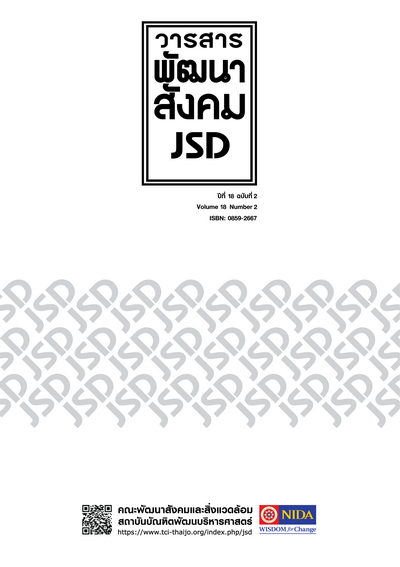กระบวนการเสริมพลังอำนาจประชาชน เพื่อการเป็นปึกแผ่นของชุมชน
Main Article Content
Abstract
การวิจัยครั้งนี้มีวัตถุประสงค์ คือ 1) ศึกษากระบวนการเสริมพลังอำนาจประชาชนเพื่อการเป็นปึกแผ่นของชุมชน (กระบวนการเสริมพลังอำนาจฯ) ที่มีความเหมาะสมกับบริบทสังคมไทย 2) วิเคราะห์องค์ประกอบสำคัญของกระบวนการเสริมพลังอำนาจฯ 3) สังเคราะห์ตัวแบบกระบวนการเสริมพลังอำนาจฯ 4) ศึกษาปัญหาอุปสรรคต่อกระบวนการเสริมพลังอำนาจฯ การวิจัยครั้งนี้อาศัยระเบียบวิธีการการวิจัยเชิงคุณภาพ ซึ่งทำการเก็บรวบรวมข้อมูลด้วยวิธีการสัมภาษณ์เจาะลึกจากผู้ให้ข้อมูลที่สำคัญ จำนวน 36 คน และวิเคราะห์ข้อมูลด้วยการตีความตามหลักตรรกะควบคู่กับบริบทของสังคม ผลการศึกษาพบว่า 1) กระบวนการเสริมพลังอำนาจฯ มี 5 ขั้นตอน คือ รวมตัวกันจัดตั้งกลุ่ม กำหนดวัตถุประสงค์ ค้นหาปัญหา สร้างข้อตกลงร่วม และขยายเครือข่ายการทำงาน 2) องค์ประกอบสำคัญของกระบวนการเสริมพลังอำนาจฯ คือ ผู้นำ ความรู้ และความไว้เนื้อเชื่อใจ 3) ตัวแบบกระบวนการเสริมพลังอำนาจฯ เป็นตัวแบบที่เน้นการสร้างจิตสำนึกร่วมของคนในชุมชนให้ลุกขึ้นมาจัดการปัญหาร่วมกัน 4) ปัญหาอุปสรรคต่อกระบวนการเสริมพลังอำนาจฯ คือ ปัญหาเรื่องคุณธรรมของผู้นำที่เข้ามาสานงานต่อ ข้อเสนอแนะจากการศึกษา คือ ควรมีกระบวนการการสร้างความไว้เนื้อเชื่อใจกันของคนในชุมชน ผ่านการทำกิจกรรมในชุมชนร่วมกัน และควรมีกิจกรรมการพัฒนาศักยภาพผู้นำ
คำสำคัญ กระบวนการเสริมพลังอำนาจ องค์ประกอบการเสริมพลังอำนาจ การเป็นปึกแผ่นของชุมชน
People's Empowerment Processfor Social Solidarity of Communities
The objectives of this research were 1) to comprehend a process of empowerment of people (PEP) that is suitable to Thailand's social conditions; 2) analyze major components of PEP in urban and rural communities; 3) to come up with a model on this matter; and 4) to study problems and obstacles related to this matter. This research used the qualitative method as the main tool with emphasis on phenomenology, collecting data via in-depth interviews with 36 key-informants. Data verification was scrutinized with the triangulation technique concerning the people, place and time involved. The data were analyzed using interpretative phenomenological coupled with a social context analysis. The research found the followings: 1) the people's empowerment process for the social solidarity of the community included 5 steps that created group activity, goal setting together, finding problems through dialogue, creating a working agreement, and expanding networks;
2) the important aspects of PEP were the 3 components of leadership, knowledge, and trust; 3) the "PEP model" focused on awareness promotion in the community to solve problems together; 4) the problem and obstacles for maintaining PEP was to succeed their moral leader. Recommendation from this research were to create mutual trust through joining community activities and to support activities of effective leadership development.
Keywords: Empowerment Process, Empowerment Component, Community Solidarity


